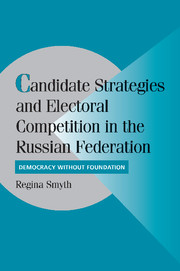 Candidate Strategies and Electoral Competition in the Russian Federation
Candidate Strategies and Electoral Competition in the Russian Federation Published online by Cambridge University Press: 25 July 2009
The work began with the idea that all candidates are important to the electoral process – even those whose candidacies are futile. The reasoning emerges from the assumption that candidates' strategic decisions are interactive, that at each point in the campaign process, decisions are made in light of the actions taken by other contestants. A fundamental goal of the work was to capture the effects of these interactions. To achieve this goal within the limits of comparative research, the survey did not randomly sample national candidates, but rather sampled as extensively as possible within case study regions. The regions included in the initial survey were Kostroma, Saratov, Yaroslav'l, and Chelyabinsk. In 1999, the sample regions were expanded to include five ethnically defined republics: Bashkir, Chuvash, Komi, Tartarstan, and Udmurt. The empirical work in this book concentrates on the 1999 data to provide the most extensive comparison among candidates, including a comparison of behavior in Russian regions and the ethnic republics.
The regions included in the study were first identified in 1994. The ethnic republics were chosen to mirror conditions within the first set of Russian regions, but also to provide some variation in the level of titular citizens in each region. These initial regions were selected based on variation on key indicators that were identified as crucial determinants of electoral behavior in Russia and elsewhere. These included region size, population, rural population, percent of pensioners, employment in industry, unemployment, the size of regional budgets, and titular population.
To save this book to your Kindle, first ensure [email protected] is added to your Approved Personal Document E-mail List under your Personal Document Settings on the Manage Your Content and Devices page of your Amazon account. Then enter the ‘name’ part of your Kindle email address below. Find out more about saving to your Kindle.
Note you can select to save to either the @free.kindle.com or @kindle.com variations. ‘@free.kindle.com’ emails are free but can only be saved to your device when it is connected to wi-fi. ‘@kindle.com’ emails can be delivered even when you are not connected to wi-fi, but note that service fees apply.
Find out more about the Kindle Personal Document Service.
To save content items to your account, please confirm that you agree to abide by our usage policies. If this is the first time you use this feature, you will be asked to authorise Cambridge Core to connect with your account. Find out more about saving content to Dropbox.
To save content items to your account, please confirm that you agree to abide by our usage policies. If this is the first time you use this feature, you will be asked to authorise Cambridge Core to connect with your account. Find out more about saving content to Google Drive.